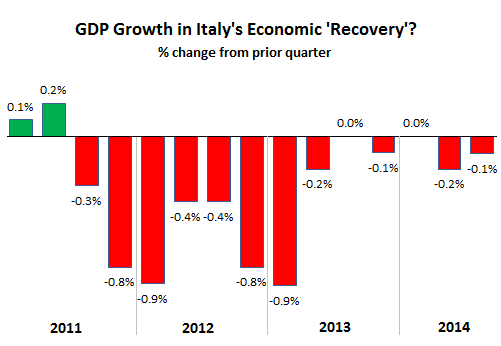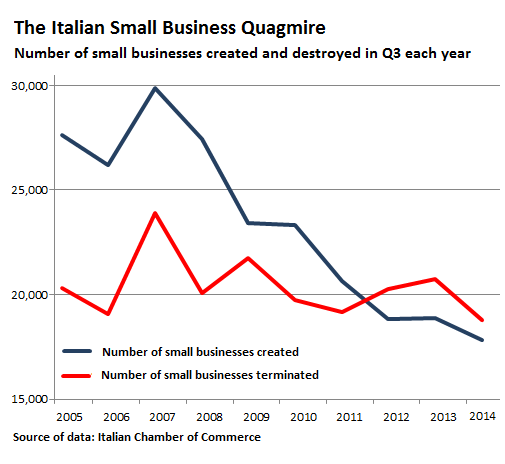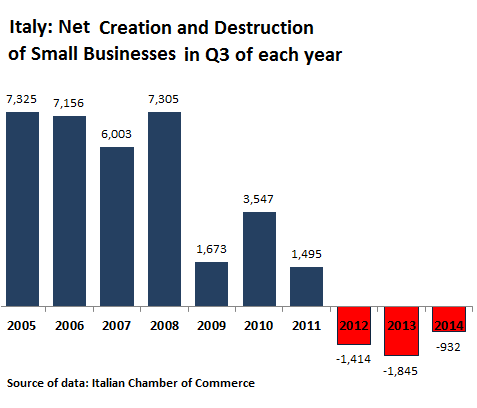Italy is a country of entrepreneurs and of vibrant small enterprises. Or was. Now these businesses are dying.
Of its 5.3 million companies (as of December 31, 2013), 3.3 million are small, often family-owned outfits, according to Rome-based credit information provider Cerved Group. And another 900,000 are sole proprietorships, or 17% of all companies, a larger percentage than anywhere else in the EU, ahead of France (12%), Spain (10%), and Germany (10%). The remaining 1 million companies are corporations of all sizes.
And life in Italy has been exceedingly tough for small outfits.
Consumer spending has dropped sharply since the onset of the crisis. Industrial production continued its downward spiral in September and is down 0.5% for the first nine months of 2014 over the same period a year ago. Unemployment is 12.6%, and rising. Youth unemployment is at a catastrophic 43%, up from an already terrible 26% in 2010.
It doesn’t help that the government refuses, and I mean refuses – due to “technical” problems, as a minister explained – to pay its long overdue bills to these already strung-out businesses. It’s a shell game to lower Italy’s overall indebtedness and thus pacify the financial markets and Italy’s masters in Brussels [Italy “Would Love To” But Can’t Pay Its Bills This Year].
So this shouldn’t come as a surprise, given that the largest customer in the country, the government, refuses to pay its bills to the members of the private sector which then can’t pay their own bills: in September, non-performing loans held by Italian banks jumped 19.7% from a year ago, according to the Bank of Italy. At the same time, loans to the private sector dropped 2.3%.
It’s a mess.
Economic “growth” has been negative or zero for the last 13 quarters. And this is what Italy’s glorious “recovery” from hell looks like:
Businesses have had a hard time in this environment. In the third quarter, the number of businesses created dropped to 72,800 the lowest for that period on record, going back to 2005, according to Unioncamere, the umbrella group of the Italian Chambers of Commerce. And 56,400 businesses collapsed or disappeared for other reasons.
But the real fiasco is playing out among the smallest companies. In Q3 2007, before the crisis tore into Italy, nearly 30,000 of them were created, while nearly 24,000 went out of business. OK, being an entrepreneur is risky and failure is common. But these small businesses are part of the economic engine in Italy. In Q3 this year, only 17,800 were created, down a staggering 40% from 2007.
The chart below, which compares business creations and destructions in Q3 of each year, shows how terrible that trend has been for small businesses:
Net creation and destruction of businesses started to skew the wrong way during the financial crisis in 2009, and instead of recovering, it got worse, with fewer and fewer businesses being created. And so for Q3 of the last three years, creation of these businesses has fallen below the number of business creations – resulting in net destruction of what is supposed to propel the economy forward:
And the survivors? 24,000 companies with sales between €2 million and €50 million are at “high risk” of defaulting within a year, according to Cerved. By comparison, between 2008 and the first half of 2014, fewer than 19,000 similar-sized companies commenced default procedures.
Daniele, an Italian entrepreneur who has been struggling for years with all the issues of building a business in Italy, wrote this in his eloquent and humorous commentary, “We, the Savvy Italians….”:
In the early 2000s, a new spending trend set foot in Italy: “Buy everything now and pay when you want.” In 2014, the middle class here is much more impoverished than it was 15 years ago. And if that wasn’t enough, since our government isn’t really capable of cutting down expenses and lowering taxes, we had many industries that moved to Asia, and we lost jobs.
With a lower base we have seen a gradual lift in taxes. And at the time when Italy was having trouble refinancing its debt, our government introduced taxes on properties and bank accounts. So, we, the savvy Italians, are paying heavy for our government failures: we have a 22% VAT, a 37% minimum revenue tax, 75% taxes on oil products…. I have calculated that in my case I pay more or less 67% of my income in taxes.
No, we are not in a rosy situation here. But as an entrepreneur I know many businesspeople; people here are eager to start something new but can’t because we are crushed by our country’s debt. If finally we could have somebody with a brain in our government, this country would bloom again.
Daniele’s words portray better than anything else what is happening on the ground in Italy to generate these ghastly economic statistics and charts. We wish him the best in his struggle.
“Punishment Interest” is what the new phenomenon is lovingly called in Germany, whose savers the ECB intends to flog until their mood improves. Read… The Wrath of Draghi: First German Bank Hits Savers with ‘Negative Interest Rates’
Enjoy reading WOLF STREET and want to support it? You can donate. I appreciate it immensely. Click on the mug to find out how:
![]()





“We are living at the ends if the Earth in the last bit of Liberty.” Briton king to his troops before engaging the Roman Legion quoted by Tacitus
Eventually the Romans left and the British tribes were free again and it all collapsed into chaos and along came the Vikings and 1066, which were setbacks but after not a few centuries the Brits practically owned the world.
So there’s hope, but unfortunately not in the time frame of my retirement unless robots and the Internet can speed things up significantly. The Britons only had druids.
Could not be more apt-the glory days of Rome and today’s Italy-LoL…
I swear I had the same dream except it played out here in the US.
“given that the largest customer in the country, the government,”
There is the problem.
Basic Income is the only answer. They are trying now to starve people but in the end there is going to be a revolution. Im giving it next two more years till people start to be really pissed off. There will never ever be recovery ever. Whole system is simply wrong.
Agree as as you said whole system is wrong and falling apart. Next up is street protest joined not only by the leftists but middle class who are fed up.
Shucks – is that the reason Department of Homeland Security (DHS) purchased a total of 1.6 billion rounds of ammunition to be used domestically, inside the United States couple of years ago and US army transferring assault rifles and surplus armored vehicles designed to withstand IED bomb attacks to police departments?
Everyday I hear the same stories of this country and that country falling apart and yet things continue as before. I think what’s missing from the analysis is the size of the underground economy of these countries. If that actually makes up for the shortfall in the above ground economy then by definition it’s not hell, isn’t it?
quote:
Everyday I hear the same stories of this country and that country falling apart and yet things continue as before. I think what’s missing from the analysis is the size of the underground economy of these countries. If that actually makes up for the shortfall in the above ground economy then by definition it’s not hell, isn’t it?
————————-
NotSoSure things here aren’t as before, I honestly have nevere seen times like these. And I am not talking just about my country, Italy, but generally here in Europe. I do travel quite a lot, I had a business in Switzerland, I do business with people from many EU states, I am in Spain right now… well apart Switzerland (they have their problems but still a very good economy and very low unemployment), the rest of Europe is a mess, “normal” economy is suffering the same as the underground one does. Resilient economies like Germany are in a better situation but they are suffering too, and they will suffer even more. There are no borders here, and really small ones with the US too, our economies are interlinked. Germany is a big exporter… yet if people in other countries have no money to buy german products where will the german economy go? and this will probably become true for the US too. US took the opposite direction in economic policies that we took here in EU, easy money there and austerity here, we have seen where we are right now, US growing EU descending to hell. So with all the evidence of these facts finally Super Mario Draghi has won the resistence of the “good” germans and has started printing… we’ll see where we go, but if EU continues on this downward path US will suffer too, we are the biggest trading partners one for the other
“US took the opposite direction in economic policies that we took here in EU, easy money there and austerity here, we have seen where we are right now, US growing EU descending to hell. ”
Many in the USA are more than eager to embrace austerity.
Quote: I think what’s missing from the analysis is the size of the underground economy of these countries. If that actually makes up for the shortfall in the above ground economy then by definition it’s not hell, isn’t it?
————————–
The underground economy (System D) in all western nations MUST grow as the ability of the PTB to satisfy the vox populi fails.
Money doesn’t wait.
Unfortunately, these governments will resort to ALL measures to stay relevant.
YMMV.
True, Presterjohn. Italy has always had a large underground economy, some of it related to the Mafia, and some to cash businesses like prostitution, drugs, etc., and some of it just regular folks trying to run a business like making salami the way they always have, but now they’re prohibited by EU rules from doing it that way, and they can’t afford to buy the newly required equipment and facility upgrades, and they don’t like the way the new salami tastes (though it may be safer), and they can’t afford the taxes the government is trying to extract from them. So why not operate in the shadows?
A while back, the Bank of Italy estimated that the criminal economy is around 10% of GDP. That part is not included in GDP. But the gray economy or shadow economy is already added to GDP. Prostitution, illegal drugs, etc. will be added to GDP in 2015. It would be interesting to see reliable data on how these sectors of the economy have grown, or if they have grown.
If they eliminated the minimum wage, youth unemployment would disappear. It would also make the underground economy smaller, and increase tax revenue.
A lot of young people are already working for free (in internships). Sure, I too could create a lot of “jobs” if I don’t have to pay people. But what are these workers going to spend? Because “spending” is what counts in GDP? “Spending” is what moves the economy. And in order to spend, you have to earn….
Wolf, thank you for the relevance you have given to my post. Mafia is surely a big problem, particularly in the south, but in the end what they generally do is to wash their “filthy” capitals and reinvest them under the sun, particularly (but not limited to) real estate in the north. Many think this is the reason why real estate prices are so high in Italy. I think a part of that criminal economy is already calculated in the GDP. On the other hand if you want to run a business here you have to consider a huge tax burden. When you take into account all the taxes (income, VAT and on property, house, fuel, heating, TV…) you end up easily over 65% as is my case. You have a “romantic” vision about the small salame producer (without a 100% hygienic production he can’t sell anything to anyone, there are really strict rules here, stricter than in US, at least from what I have seen in my experience in NY…) The Italian food industry is one of the biggest in the world and big companies will never pay that much taxes, they’ll just use one of the tax heavens Europe is full of (last example was Fiat-Chrisler or the chip producer STMicro that moved from Sicily to Switzerland), all that tax burden lies on the workers and the small business like mine. In the end you HAVE to evade a %, (= hide a part of GDP ) or you die. this to me is the biggest hidden part and in my opinion it is at least 20% of real GDP but probably higher. Thing is that politicians are aware of this situation since probably 50 years, and have never really intervened, business grew, GDP grew, people had plenty of work, so everybody was ok with it. Everybody knew that in order to run a business in Italy you had to lower a bit your taxes, it is simple maths, it is really hard for a business to survive when you have to pay 65% in taxes… that of course has become more urgent as borders have fallen with east Europe and China has started flooding our markets with cheap stuff. No way to compete in a global economy with such a burden on your shoulders. Now that the economy is falling, politicians are blaming tax evasion, so since the crisis instead of cutting down expenses they are witch hunting tax evaders. In the end small business have to sustain a very soft market, continuous tax hikes (as Italy struggle to pay its debt and can not print money as used to do before the Euro), and a witch hunt from the tax-men.. people just throw in the towel and go elsewhere, or stay here and get crushed.
Daniele, sorry for the delay in getting your comment posted. I found it hung up in my spam filter. Not sure why.
BTW, the salami maker example was a bit facetious. These folks are dear to my heart. For thank-goodness, we have several (former) Italian salami makers in San Francisco. I love their product. My wife dealt with them and was introduced to their production facilities, etc., and the issues they face (aging raw meat safely under very controlled conditions, etc.). So I got a little intro. My understanding is that EU regulations may be stricter than ours.
“Next up is street protest joined not only by the leftists but middle class who are fed up.”
Great prediction! Looks like it came true today in Milano, Padova and Roma.